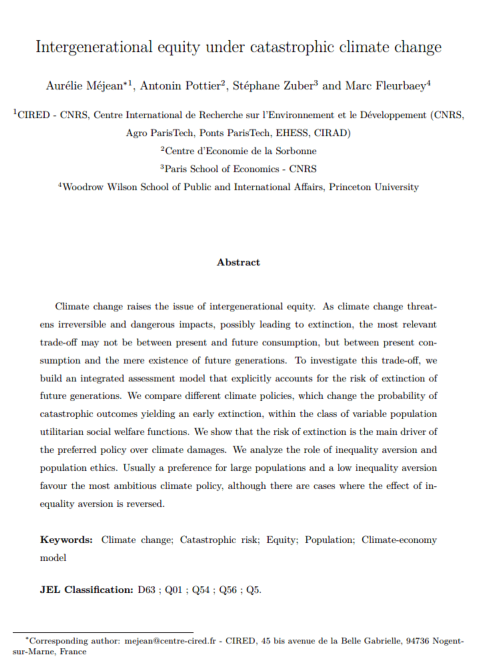Intergenerational equity under catastrophic climate change
Aurélie Méjean (CNRS, Paris), Antonin Pottier (Centre d’Economie de la Sorbonne), Stéphane Zuber (Paris School of Economics - CNRS) and Marc Fleurbaey (Princeton University)
GPI Working Paper No. 5-2020, published in Climatic Change
Climate change raises the issue of intergenerational equity. As climate change threatens irreversible and dangerous impacts, possibly leading to extinction, the most relevant trade-off may not be between present and future consumption, but between present consumption and the mere existence of future generations. To investigate this trade-off, we build an integrated assessment model that explicitly accounts for the risk of extinction of future generations. We compare different climate policies, which change the probability of catastrophic outcomes yielding an early extinction, within the class of variable population utilitarian social welfare functions. We show that the risk of extinction is the main driver of the preferred policy over climate damages. We analyze the role of inequality aversion and population ethics. Usually a preference for large populations and a low inequality aversion favour the most ambitious climate policy, although there are cases where the effect of inequality aversion is reversed.
Other working papers
Economic inequality and the long-term future – Andreas T. Schmidt (University of Groningen) and Daan Juijn (CE Delft)
Why, if at all, should we object to economic inequality? Some central arguments – the argument from decreasing marginal utility for example – invoke instrumental reasons and object to inequality because of its effects…
The case for strong longtermism – Hilary Greaves and William MacAskill (Global Priorities Institute, University of Oxford)
A striking fact about the history of civilisation is just how early we are in it. There are 5000 years of recorded history behind us, but how many years are still to come? If we merely last as long as the typical mammalian species…
In Defence of Moderation – Jacob Barrett (Vanderbilt University)
A decision theory is fanatical if it says that, for any sure thing of getting some finite amount of value, it would always be better to almost certainly get nothing while having some tiny probability (no matter how small) of getting sufficiently more finite value. Fanaticism is extremely counterintuitive; common sense requires a more moderate view. However, a recent slew of arguments purport to vindicate it, claiming that moderate alternatives to fanaticism are sometimes similarly counterintuitive, face a powerful continuum argument…

